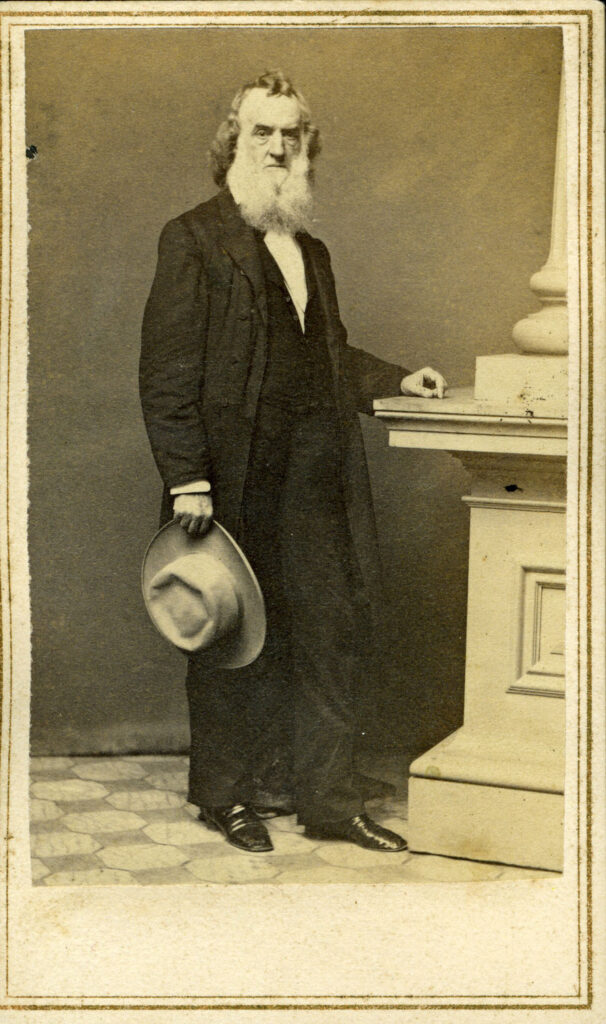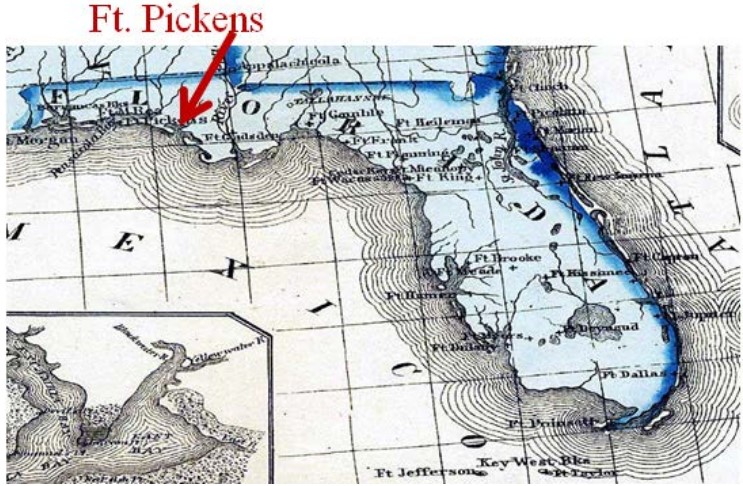Section #22 - The Southern States secede and the attack on Ft. Sumter signals the start of the Civil War
Chapter 288: Confusion Reigns As The Federal Expeditions To The Forts Head Out
April 4, 1861
An Angry Gideon Welles Confronts Lincoln About The Sumter Expedition

On April 4 Lincoln learns that Anderson is almost out of food.
He responds by drafting a note to the Major in Cameron’s name, saying that reinforcements are coming, and that he should hold out as long as possible, surrendering only if starvation risks the life of his men.
He then sends for Lt. Fox who is leading the Sumter expedition. He says that the voyage is a go, that it will include both provisions and soldiers, and that Fox needs to launch it in the next two days.
In a panic, Fox heads to Naval Secretary Gideon Welles for support. His main request is to for the frigate Powhatan and Welles signs off on the order – totally unaware that it has already been promised to Meigs for his secret mission to Ft. Pickens in Florida.
All seems well until that evening when Lincoln’s personal secretary, John Nicolay, suddenly appears to inform him that the President and Seward have already assigned Powhatan to another naval initiative. Welles is outraged by this intrusion on his authority, and arrives at the White House near midnight with Seward in tow to demand an explanation.
Lincoln apologizes to Welles and dissembles, saying the mistake was an accidental oversight on his part. But by now his concerns about Anderson’s fate have risen, and he changes course, telling Welles that Fox can have Powhatan for Sumter.
This solves the immediate flare up, while leaving Seward angry about his pet Ft. Pickens project, and Welles still totally unaware of it.
April 6, 1861
Captain David Porter Takes Off On His Own To Florida

An upset Seward is slow to notify Meigs and Keyes about Lincoln’s change of heart, and by the time the news arrives at the Brooklyn Naval Yard, Captain David Dixon Porter has already left aboard Powhatan, on his way to Pickens.
A speedy tugboat chases him down some fifteen miles away off Staten Island, and hands him a note signed by Seward to abandon his voyage.
He refuses to do so, telling the messenger:
This is an unpleasant position to be in, but…I received my orders from the President and shall proceed and execute them.
The rest of his fleet soon follows: Meigs aboard the transport ship Atlantic and Keyes on the Illinois.
Consistent with all of this planning confusion is the ultimate outcome regarding Powhatan.
For Lt. Gustavus Fox it means the loss of the crucial landing boats he needs on April 12 to bring his men and supplies into Ft. Sumter. For the Ft. Pickens effort, Powhatan proves trivial, no more than an excess ornament on what will be an easy and successful operation.
April 8, 1861
The Sumter Expedition Heads Out Amidst Press Coverage
A shaken Lt. Fox, already two days behind the timetable handed him by Lincoln, has been scrambling to assemble his Sumter fleet and provisions.
He lines up the revenue cutter Harriet Lane and the Baltic, both in New York, along with Pocahontas at Norfolk, and Pawnee at Washington. He also locates 300 troops and supplies for up to a year.
The Sumter Fleet
| Ships | Propulsion | Tons | Cannons | Debarks From |
| Harriet Lane | Steamer | 730 | 1-4”, 2-8”, 1-9”, 2-24# | New York |
| Baltic | Steamer | 2723 | Passenger | New York |
| Pocahontas | Steamer | 558 | 1-10#, 1-20# 4-32# | Norfolk, Va |
| Pawnee | Steamer | 1533 | 2-12#, 8-9” | Washington |
Fox is on board Baltic when it leaves along with Harriet Lane on April 8; the other two ships do not get under way until two days later.
These departures are quickly picked up by the press, with James Pike of Greeley’s New York Tribune breaking the story:
The President is unwilling to strike the national flag and determined not to permit the garrison at Ft. Sumter to be starved out or abandoned… to a humiliating surrender.